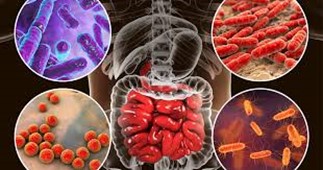Each of us together with a community of trillions of numbers and varieties of microorganisms lives in our intestines. These bacteria make up about 2-3 kg of our total weight. These microscopic creatures, called microbiomes, which make up their own habitat and balance of life, are quite useful as long as they remain in the intestines. Hippocrates, who is considered the father of medicine, recently introduced the saying “our intestines are our second brain”, which is a fairly common opinion, with the thesis that “all diseases begin in the intestines” A.C. the 450s have also explained it. In fact, both views indicate the importance of this microbiome community that has been living with us since the moment we were born.
The sheltered and autonomous environment provided by probiotics (beneficial microbiome) in our intestines is the main reason why they react with the same violence to all negative effects that will upset their balance from the outside and start to be harmful to us now. The imbalance of microbiota affect the relationship between our intestines and brain, and our quality of life will begin to change. Hippocrates summarized this situation to his students as “as a result of improper nutrition, some indigestible residues emit steam, and these vapors cannot be removed from the body, leading to diseases”. This imbalance of microbiota is called dysbiosis in today's medical literature. One of the causes of many diseases that affect our quality of life due to what we eat is this dysbiosis, that is, the deterioration of the intestinal flora. With the constant occurrence of improper nutrition, the addition of a toxic and stressful life to it, this condition becomes chronic and the “Leaky Gut Syndrome” is formed.
 What is Leaky Gut Syndrome?
What is Leaky Gut Syndrome?
Intestinal cells; digest the nutrients we receive outside in a tight sequence and ensure that almost all of them are absorbed, bringing only these nutrients from our intestines to the size that can pass into the blood. Leaky gut syndrome, on the other hand, is a condition in which this tight sequence between cells begins to be destroyed, the permeability from the intestines to the blood increases at an undesirable rate, and the microbiome can no longer provide the barrier task between the blood and the intestine. After this stage, harmful toxins and microorganisms in our intestines will pass into the blood without encountering an obstacle, and in our body; asthma, allergies, celiac disease, chronic diarrhea, diabetes, chronic fatigue, migraines, Alzheimer's and various immune system diseases will begin to show themselves. Our mental health and quality of life will also be greatly affected due to all these ailments that we don't know the exact cause of. This interaction between the brain, blood circulation and our intestines is also the main reason why our intestines, which have millions of nervous systems and their own habitat, make their own decisions and have recently called the intestines the second brain.
The ideal situation for our microbiota in our intestines is that the proportion of good and bacteria remains at a balance of 80% and 20%, respectively. However, there are some foods that disrupt the balance of good /bad bacteria in our daily lives. Almost all of the nutrients that disrupt this balance and increase permeability contain carbohydrates and sugar. In particular, it is necessary to pay more attention to carbohydrate sources that contain high levels of gluten, such as wheat, barley, rye, and also damage the intestinal wall, with such symptoms. Since these foods are also the cause of gluten sensitivity, it is thought that there is a strong link between leaky gut syndrome and gluten sensitivity.
Probiotics and Prebiotics are useful food groups that can help rebalance the intestines. Useful living microorganisms contained in healthy intestinal flora are our natural probiotic stock. This stock begins its life with us from the moment we are born, and they grow up with us. They strengthen our immunity, regulate the functions of the intestinal / blood wall and act as a protective barrier. They are found naturally in breast milk and fibrous fruits and vegetables. Prebiotics contain fiber and ensure the activity and reproduction of probiotics, that is, their nutrition. In this respect, it is at least as valuable as probiotics. As a grift, probiotics cannot be fed without prebiotics, and they can also be taken as food supplements from outside if needed.
 THE RELATIONSHIP OF OUR INTESTINAL HEALTH WITH OUR HAPPINESS…
THE RELATIONSHIP OF OUR INTESTINAL HEALTH WITH OUR HAPPINESS…
Another miracle of our intestines is that they produce 70% of Serotonin, also known as the hormone of happiness, by themselves. This hormone means that our body needs to be calmer, balanced and optimistic, otherwise it will create a state of depression and anxiety. In addition to obesity, permeable bowel syndrome also leads to gas, bloating, reflux and hormonal problems. These are menstrual and premenstrual problems, and their symptoms are problems caused by hormonal influences.
According to all this information, in order to maintain the health and self-balance of our intestines again;
• The most important food of our healthy intestinal habitat is indigestible fibers, which are also found in what you eat. For this purpose, Prebiotic and Probiotic supplements will be a great support to restore the balance of our intestines.
• Since avoiding antibiotics and all kinds of processed foods directly affect our microbiome balance, it will be necessary to minimize processed foods and, if possible, unnecessary antibiotic use.
• In this syndrome, it will be supportive to avoid alcohol, caffeine and spicy foods and pay attention to a quality sleep.
• Consuming gluten-free foods is one of the most important causes of increased intestinal permeability. In addition, gluten products often have a negative effect on this ailment, as they are obtained from processed grain products. Removal from our diet and one by one monitoring of its effects will be useful in recovery.
• Microbiota refers to trillions of different and diverse microorganisms. This diversity also makes them like different foods. For this reason, as we can add to our diet, our microbiata, our intestines and quality of life will improve at the same rate.
Gülnihal Deniz
MSc Chemical Engineer